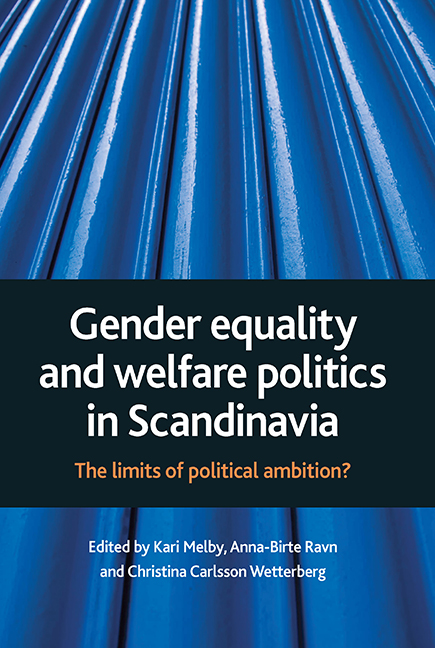Book contents
- Frontmatter
- Contents
- List of tables
- Preface
- Notes on contributors
- A Nordic model of gender equality? Introduction
- Part One Meanings of gender equality in Scandinavian welfare policy
- Part Two Current challenges: competing discourses on gender equality
- Postscript Gender, citizenship and social justice in the Nordic welfare states: a view from the outside
- Postscript Future research on gender equality in the Scandinavian countries
- Appendix Tables 1-10
- Index
four - Family policy between science and politics
Published online by Cambridge University Press: 21 January 2022
- Frontmatter
- Contents
- List of tables
- Preface
- Notes on contributors
- A Nordic model of gender equality? Introduction
- Part One Meanings of gender equality in Scandinavian welfare policy
- Part Two Current challenges: competing discourses on gender equality
- Postscript Gender, citizenship and social justice in the Nordic welfare states: a view from the outside
- Postscript Future research on gender equality in the Scandinavian countries
- Appendix Tables 1-10
- Index
Summary
Introduction
Should the state regulate family affairs? If so, how and under what circumstances? These questions have dominated family policy debates over many decades and in most states. In Sweden, many ideas on how ‘the family’ should be organised have been presented by intellectuals, politicians and experts over time, and reforms of family regulations have emerged since the early 1930s.
This chapter studies the development of Swedish family politics between the 1930s and the early 1970s. My point of departure is that the emergence of Swedish family politics is mainly based on interplay between (i) research on family and gender relations, (ii) government expertise, (iii) social policy, and (iv) labour market regulation (Immergut, 1992; Orloff, 1993; Rueschemeyer and Skocpol, 1996; Daly, 2000). Thus, I will analyse the amalgamation of political ambitions, social reforms, and ideas and suggestions put forward by experts in governmental commissions. The main object is to explore the arguments behind social and family policy proposals between 1930 and 1970, and how they were implemented.
Another aim is to discuss the meaning and understanding of gender behind the expansion of Swedish family politics between 1930 and 1970.
The governmental commission reports in the Swedish political landscape: some methodological reflections
To understand the growth of family policy, some specific features of the Swedish political system, that is the important role of governmental commissions in policy formation in Sweden, must be highlighted.
In Sweden, central ministries are relatively small, due to the fact that policy implementation is the responsibility of independent government boards and agencies. The practice of preparing governmental proposals through ad hoc commissions has also contributed to the limited size of governmental administration. Furthermore, the central role played by ad hoc commissions and independent public agencies in the policy process means that experts and state officials have been very important policy shapers, especially in emerging fields such as family policy.
Historically, these commissions included representatives from almost all political parties, as well as interest groups, civil servants from relevant ministries and agencies, and academic experts. The different representatives were involved already at an early stage of policy formulation. For this reason, the system of ad hoc commissions has been considered a knowledge-producing institution as well as a key institution for consensus building in Swedish politics (Johansson, 1992).
- Type
- Chapter
- Information
- Gender Equality and Welfare Politics in ScandinaviaThe Limits of Political Ambition?, pp. 85 - 100Publisher: Bristol University PressPrint publication year: 2008
- 1
- Cited by



